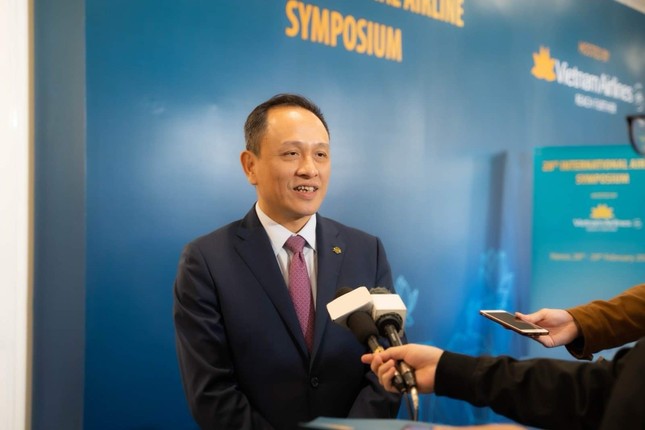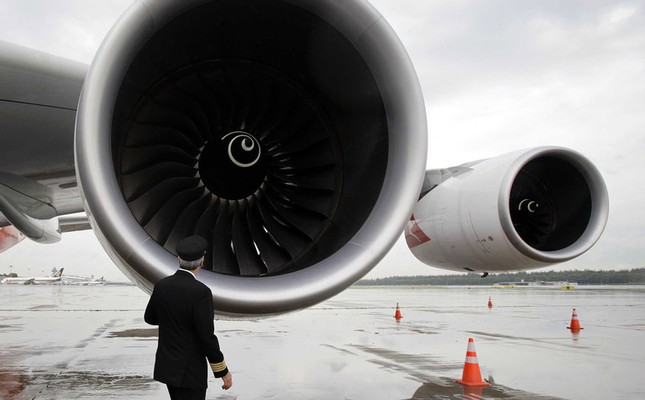At the International Aviation Summit (IAS) 2024 with the theme “Aviation: Navigating Uncertainty”, currently taking place in Hanoi, experts have made comments on the current issues in the aviation industry.
Many believe that the global aviation market has been greatly affected by conflicts and pandemics. Shortage of manpower and disrupted supply chains have become two factors that have caused difficulties for airline businesses in recent times.
Mr. Le Hong Ha – CEO of Vietnam Airlines – expressed the opinion that an airline needs to navigate by focusing on strategic vision, market analysis, customer experience, technology application, sustainable development, safety, compliance with regulations, and employee involvement. In particular, efficient fleet management is key to optimizing operations and meeting passenger demands…

Mr. Le Hong Ha – CEO of Vietnam Airlines. Photo: VNA.
The CEO of Vietnam Airlines stated that the biggest challenge for the airline currently is the shortage of manpower. This has been the case in the past 2-3 years, especially after the COVID-19 period.
“This situation has led to a shortage of emission control materials, maintenance facilities, and equipment for aircraft or many other products. For example, in the recent engine recall for A321neo aircraft, Vietnam Airlines has 24 engines, corresponding to 12 aircraft in need of maintenance. Vietnam Airlines’ narrow-body fleet includes nearly 60 Airbus A321 aircraft, losing 12 of them is a big impact,” said the CEO of Vietnam Airlines.
According to Mr. Ha, the engine maintenance time for Airbus A350 aircraft is increasing in Vietnam. Previously, it took an average of about 100-120 days to perform maintenance on an engine. Now, this activity takes up to 250 days, even 300 days.
Not only Vietnam Airlines, the shortage of materials also poses challenges for many other airlines in the region. Mr. Michael Szucs – CEO of the Philippine low-cost airline Cebu Pacific – informed that “The delivery of Airbus aircraft to us will be delayed by 9 months compared to the scheduled time”.
The above-mentioned challenges require airlines to change their business management approach to cope with the shortage of manpower in order to maintain supply, serve the market, and passengers.
Professor Nawal Taneja – the host of the IAS International Aviation Summit currently being held in Hanoi – said, “The challenges that the aviation industry has faced in recent years have been significantly different, especially since COVID-19. This comes from conflicts of political geography, artificial intelligence technology, and environmental changes”.
This scholar emphasized that the Government and the transportation industry of each country need to have programs, mechanisms, and policies to develop aviation. In the “new normal” context, airlines around the world need to shape sustainable development strategies, overcome difficulties, and apply technology, as well as manage a cohesive workforce. In the long term, suppliers will need to find ways to manage manpower to shorten the aircraft maintenance process, promote new technologies through the sharing of information and the use of technologies such as artificial intelligence (AI) and data analysis, thereby coming up with optimal solutions for engine repair and maintenance.
Airlines expressed their desire for a modern data system that can accurately predict the timing for aircraft maintenance. When correctly anticipating this situation, the airline will be more effective in carrying out inspections and ensuring the stable operation of the fleet.

Aircraft maintenance activities are being highly regarded by airlines.
Improving service quality is the prerequisite for airlines to adapt to today’s competition. Mr. Junichiro Miyagawa – representative of the Japanese airline All Nippon Airways (ANA) – assessed that airports in Japan have gradually become crowded again and the aviation industry is striving to meet customer demand. However, the demand for travel serving the trade has not yet returned to its pre-COVID-19 level.
“Given the current situation, airlines need to continue to focus on core aviation operations, strive to develop customer service capabilities, diversify business operations, expand markets, and build new ecosystem platforms,” suggested the representative of ANA.















